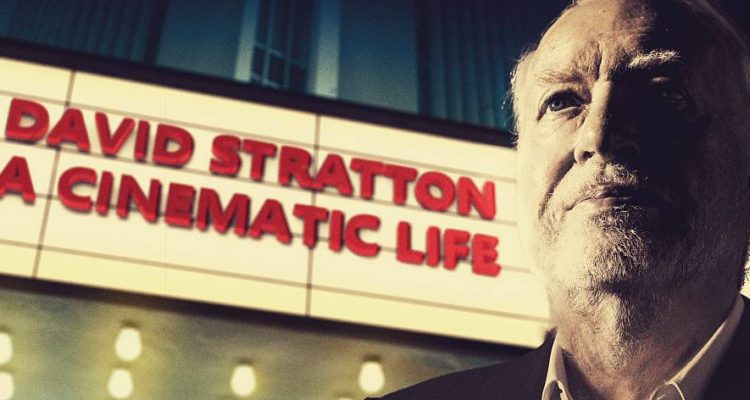David Stratton: A Cinematic Life is a deep and frankly fascinating look at the evolution of the landscape of Australian film, and the struggle that the film industry has faced over the years, through the eyes of national treasure David Stratton. It almost feels as if Stratton himself is taking you on a journey through time through the lens of Australian film from Jedda (1955) to The Dressmaker (2015). Compressing five decades into ninety minutes can’t have been easy for director Sally Aitken, but it feels seamless and is endlessly enjoyable.
David Stratton was one of 2 million immigrants that arrived in Australia between 1945 and 1965, and the biographical portion of the documentary is a fascinating look at a young English boy whose family didn’t understand his passion for cinema. The personal anecdotes are interwoven seamlessly with pieces of the films that Stratton said touched, shaped or influenced him in some way. For example, Stratton didn’t meet his father until he was six years old because of the outbreak of World War II, so he explains why he identifies with the film Careful He Might Hear You (1983) as he discusses his once-absent father.
In the 60s and 70s, Stratton was an active campaigner in the movement to overthrow what he calls the “draconian” censorship laws put in place the “ignorant, stupid Philistines” on the censorship board, insisting that “films have a right to be seen”. At the time, he was involved in the Sydney Film Festival, which was then still in its infancy. There’s also an incredibly humorous moment when he explains that he was under surveillance for over a decade during the Cold War under suspicion of being a communist, because he once visited the Russian Embassy for a visa in order to attend the Moscow International Film Festival.
But documentary is not a one-sided look at the glory that is David Stratton. For instance, he was so conflicted by the film Romper Stomper (1992) that he declined to give it any stars, and he’s no sooner finished explaining why when Aitken cuts to an interview with director Geoffrey Wright, who has no trouble taking Stratton down a peg or two by telling the story of how he threw a glass of wine in his face for the slight.
Stratton also touches on the country’s fascination with the crime genre, discussing everything from the world’s first-ever feature film The Story of the Kelly Gang (1906), movie which literally predates Hollywood, to the “terrifying and masterful” Animal Kingdom (2010).
Stratton also pays particular attention to Aboriginal films, starting with Jedda (1955) which was the first Australian feature film to ever play at Cannes. Casting two unknown Aboriginal actors in the lead was unheard of, and even Prime Minister Robert Menzies was “scathing” of the project. Although it didn’t win the coveted Palme d’Or, it was a catalyst for Indigenous filmmaking, including one of Stratton’s favourites – the “unflinching” Samson and Delilah (2009).

David Stratton and David Gulpilil (“Crocodile Dundee”, “Rabbit Proof Fence”) at the Sydney Film Festival 2016.
He also admits that his judgement is not infallible. Twenty years ago, he slammed beloved Australian classic The Castle (1997), giving it a measly one and a half stars and saying “it was lucky to get that!” But revisiting it in 2016, he admits that is is a “satisfying and beautiful portrait of a family”, and gives it four stars.
The highlight of the documentary is the hilarious interludes with Margaret Pomeranz, throwing back to the very best days of At The Movies, which ran on SBS and then ABC, from 1986 to 2014. His self-deprecating humour and her vicious yet affectionate insights into his personality combine to remind us why the pair worked so well together for almost three decades – their professional chemistry is undeniable.
Interspersed with the numerous clips from Australian films are interviews with the kings and queens of the Australian screen; Nicole Kidman, Russell Crowe, Sam Neil, Geoffrey Rush, Sarah Snook, Eric Bana and more. It really demonstrates the length and breadth of Stratton’s influence and some of Hollywood’s most respected A listers have so much to say about the career of an Australian film critic. In contrast to the high profile celebrities are down-to-earth stories about his family – he literally tears up when telling the story about how his mother, who has never understood his interest in cinema – overheard a Melbourne couple praising At The Movies and told them, “That’s my son.”
Stratton’s passion for cinema all but jumps off the screen – “Aussie films are the films that made me”. This masterful documentary makes you want to quit your job, make a cup of hot chocolate, and hunker down the home-grown classics of which Stratton speaks so fondly. If nothing else, it’s a lively guide to the very best of Australia cinema, as told by the most knowledgable film critic in the country.
David Stratton: A Cinematic Life will be in cinemas from March 9. Watch the trailer here.











Leave a Reply